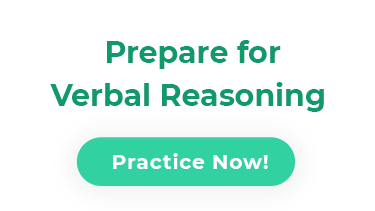What Is the Verbal Ability Test?
The verbal ability test is a type of a verbal reasoning psychometric exam that measures your aptitude towards knowledge of the English language. This assessment is relatively broad in that it can cover a wide range of questions such as reading comprehension, vocabulary, analogies, sentence completion, and grammar. Practicing these skills creates confidence, and the skills often overlap. Due to the broadness of the verbal ability test, taking the test can feel daunting. Don’t worry, this guide will help aid in your preparation for taking the verbal ability test!
How to Prepare for the Verbal Ability Test?
Below you will find some tips for understanding and preparing for the verbal ability test.
- Understand the test format. Familiarize yourself with the test structure. As aforementioned, the verbal ability test can cover a wide range of topics, so be sure to practice and utilize online resources such as this one.
- Build your vocabulary. Develop a strong vocabulary by reading a variety of materials, including books, articles, and newspapers. You can also use flashcards to memorize new words, their meanings, and how to use them in context. Finally, practice using these new words in sentences to reinforce your understanding of them.
- Enhance reading comprehension. Read a diverse range of texts and genres, including fiction, non-fiction, and academic articles. Practice summarizing the main points of these texts after you read them, and be sure to pay attention to details, themes, and the author’s purpose when reading.
- Develop critical reading skills. Identify the main idea and supporting details in passages by recognizing the author’s tone, point of view, and underlying argument. You also need to practice drawing inferences and making logical deductions from the text.
- Master analogies. Understand the relationship between the words in an analogy (synonyms versus antonyms, part versus whole, and cause/effect relationships).
- Sentence completion. Work on improving your understanding of sentence structure and grammar. Practice completing sentences with appropriate words to maintain coherence and logical flow.
- Brush up on grammar. Review fundamental grammar rules such as subject-verb agreement, tenses, pronouns, and modifiers. Along these lines, also practice identifying common errors such as run-on sentences, sentence fragments, and parallelism.
- Learn how to infer. Many of the question types within the verbal ability test rely on your ability to make inferences, or educated guesses that fill in informational gaps. For example, when looking at analogy questions, you have to infer the relationship between them. For reading comprehension questions, you need to infer things like the main idea, argument, and theme. Practice making these educated guesses regularly and you’ll be well on your way to succeeding within the test questions.
- Time management. Understand the time limits for each section of the verbal ability test (it will be written on your test!) and allocate your time accordingly.
- Simulate testing conditions. Practice in an environment that mimics the conditions of the actual test: a quiet room with no distractions. Time yourself as you work through sample questions to build your confidence and improve your speed.
- Review and analyze mistakes. After completing practice verbal ability tests, be sure to review the questions you got wrong. Make notes of your errors so that you can learn from them and avoid making them in the future!
- Stay calm and confident. When you take the verbal ability test, remember to stay calm and approach each question with confidence. Read each question thoroughly and don’t rush.
Remember, improving verbal ability takes time and consistent effort. By following this guide and dedicating yourself to regular practice, you can enhance your performance on verbal ability tests and achieve your desired results!
Like we just went over, practice makes perfect! Let’s take a look at an example question to practice together:
Verbal Ability Test Example Question:
Read the following passage and answer the question based on it.
“The Industrial Revolution brought about significant changes in the 18th and 19th centuries. It marked a shift from agrarian economies to industrialized ones, leading to urbanization, technological advancements, and changes in societal structures.”
What was one of the main consequences of the Industrial Revolution?
- An increase in agricultural practices.
- A decline in technological advancements.
- A shift from rural to urban areas.
- A decrease in societal changes.
Explanation: One great tactic you can use on the verbal ability test is the process of elimination, or getting rid of obviously incorrect answers first to help you find the correct answer. We can safely eliminate A and B due to these statements being the opposite of what is stated in the second sentence in the excerpt (there was a shift away from agriculture and an increase in technological advancements). This leaves us to decide between C and D.
Let’s look at answer D: a decrease in societal changes. The very end of the passage states that there were “changes in societal structures,” but we do not know if the structures saw a decrease in change or an increase in change (based off of the excerpt, at least). However, we know for a fact that there was a shift from rural to urban areas, so the correct answer is C: A shift from rural to urban areas.
In this particular question, we actually used a combination of elimination and inference. To infer is to “read between the lines,” or use context clues to fill in informational blanks. For example, we knew that answer choice A was incorrect because we inferred that from the quote, “ . . . a shift from agrarian economies.” From in this case also means away, and agrarian refers to agriculture-based economies. Being able to make inferences such as this one will go a long way when it comes to taking the verbal ability test, so be sure to practice your inference!

